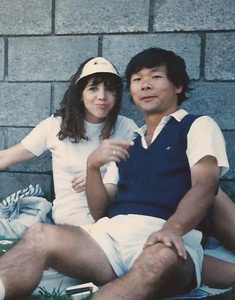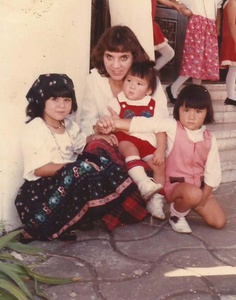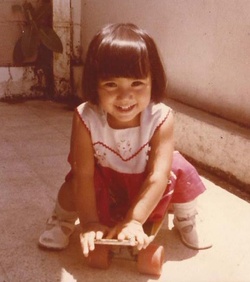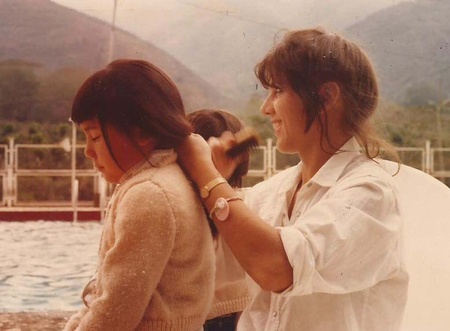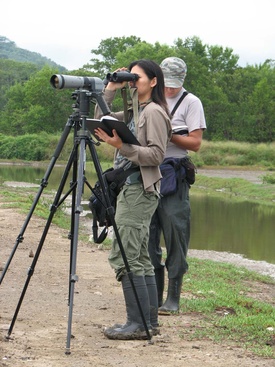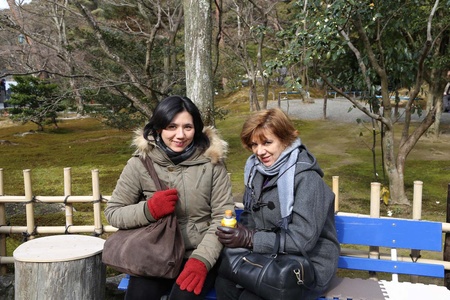My name is Aiko. I was born to a Costa Rican mother and a Japanese father. People often ask me, “And your Spanish name is?” or “What’s your middle name?” but I always say “simplemente Aiko” (It’s simply Aiko.)
My mother was born in the heart of a mountain in Costa Rica, and when she saw an Asian man in a dance hall in a country town, she knew that she was going to marry that Chinito1. At that time she had not even seen the ocean, let alone other countries, and of course she knew almost nothing about Asia. But her instinct became reality, and she gave birth to three children: Keiko, Aiko, and Yoji.
On the other hand, my father who is from Osaka had wanted to visit a faraway country since he was in middle school and was determined to go to Costa Rica someday as he learned about the country at Japan World Exposition when he was in college. After college graduation, he promised to his parents that he would be back in a year as they opposed to his leaving the country, got on a ship and crossed the Pacific Ocean. He made his dream come true. And he ended up living in Costa Rica.
Many nikkei people in Latin America have a Spanish name and a Japanese name, but my parents thought that one name would be enough for their kids. Hence, my name is simplemente Aiko – simply Aiko. I also get asked how my name is written in kanji. The kanji for my name ai means deep blue which is the favorite color of both my father and my mother’s.
I could hardly speak any Japanese when I entered Japanese school at age six. Why can’t Aiko understand Japanese? My classmate who had just come from Japan would ask, and my classroom teacher explained, “Because Aiko’s mother is from Costa Rica, and she always speaks Spanish at home.” Then the kid shouted, “I see, then Aiko is half-breed!” At that time, I didn’t understand what they were talking about, but that “half-breed” incident was passed on for years, and I was reminded of it over and over again. The description itself surely deserves some criticism, yet I can’t say that my classmate meant any harm. One thing for sure, though, is that a discriminatory implication from the perspective of grownups was included in the word. But I can’t help laughing at the word choice of a child.
A similar thing happened to me over ten+ years later. I was taking an entrance exam of Central American stockbreeding school. As I was sitting in the very back row, taking the exam in a seemingly too-large room considering the number of examinees, an instructor whose job was to walk around the room to watch us looked closely at my answer sheet and saw my name – Aiko Takahashi Chinchilla2. “You have an unusual name,” he said. When I told him that my father is Japanese, his eyes got bright and he stated, “That means you’re a hybrid!”
This teacher’s statement can also be a target of accusation for its rudeness and discrimination. But looking at his smile with bright eyes, I just couldn’t help bursting into laughter. Many people seem to think of “hybrid” as a type of automobile, but what it actually means is a mixture of different types, and it refers to the offspring of different breeds in the field of farming. For example, cattle in Europe have a big amount of fat in their tender meat, but they are vulnerable to heat and can’t survive in lowlands of tropical zones. On the other hand, an Asian cattle type called kobu-ushi has hard meat, yet they don’t lose appetite in hot weather and are pest-resistant. When you mix the two, you get a kind of cattle that are good in meat quality and can live in tropical environments. In other words, by mixing things that greatly differ in characteristics, we can get something that has strong points of both with less weakness. So I think that when the teacher said the word “hybrid” he must have simply meant it as a compliment.
By the way, some people tell me I’m half when I introduce myself to them for the first time. And others say that I should be labeled “double” because I have inherited two cultures from my parents. But personally I’m hesitant to accept either of the terms. It’s not that I see them as something to be looked down on. Rather, I think that people have a stereotypical image of “coolness” when they use the words. However, I believe that everyone is half and double, whether their parents are of same nationality and ethnicity or not. We are all half because we have half of the genes from our fathers and the other half from our mothers, and we are all double because we are a mixture of two humans. There’s nothing special to it; that’s how things are and I think it’s a great thing.
Another question I get asked a lot is “Do you think you are more Japanese or Costa Rican?” I thought about this a lot in my adolescence. I think that we as humans need a sense of belonging to feel secure. We feel insecure when we can’t identify ourselves. In Costa Rica, people always called me “China3,” and they would ask “Do you understand Spanish?” when they saw me for the first time. And among the Japanese I was often treated differently because I am not 100% Japanese to them. I was having a hard time accepting myself as an outsider just wherever I happened to be.
After adolescence I was able to tell myself – I am just me - but still I didn’t have a clear answer to the question. Now that I’ve lived in Japan for six years, experiencing cultural shock on a daily basis, I’ve come to think of myself as non-Japanese after all. I speak Japanese and I have a Japanese name, but now I say that I’m Costa Rican when asked about my identity. However, I have to admit that it comes from my feeling inferior to Japan (to some extent) because I am aware that my view toward Japan is prejudiced since I can’t fully accept Japanese sense of values and cultures.
I’m sure that the way I look at Japan, Costa Rica and the world will continue to change as I gain more experience. I wish I could look at the world with non-prejudiced eyes like God does. I want to be able to accept things without any prejudice, things that are not limited to nationalities or ethnicities but also things like people’s body shapes, customs and ways of thinking, ways of expression and just how things are. Yet at the same time I want to have a strong belief in myself that would encourage me to state my own opinion when necessary. You might say I’m contradicting myself, but I think that if we just let ourselves move with wind, we won’t be able to do anything.
Of course, it’s never possible to take prejudice completely out of my head. Culture has prejudice embedded in itself, and there is no such thing as a human without culture. But if we admit that we are full of prejudice, and have an interest and an imagination for the life of people who are different from us, I’m sure that we will be able to respect our neighbors more as well as ourselves.
My name is Aiko. I’m a kind of human who wants to make full use of my innate ability aside from being Costa Rican or Japanese.
Note:
1. Refers to Chinese or Asian in Spanish (masculine form, diminutive)
2. It’s common in Spanish-speaking countries for people to have two family names: one from their fathers and the other from their mothers
3. Refers to Chinese or Asian in Spanish (feminine form)
© 2016 Aiko Kenmochi


